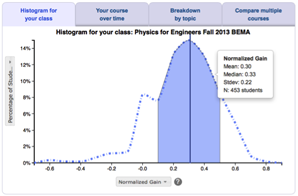
Developed by: Carl Wieman, Kathy Perkins, and Sam McKagan at the University of Colorado Boulder








middle schoolhigh schoolintro collegeinter-mediateupper levelgrad school other

calc based

alg based

conceptual







Overview
What? Curriculum for a large-lecture modern physics class for engineering majors. Focus on reasoning development, model building, and real-world applications. Includes lectures, clicker questions, homework, exam questions, PhET simulations, learning goals, and discussion of common student difficulties.
Student skills developed
- Conceptual understanding
- Problem-solving skills
- Making real-world connections
- Using multiple representations
- Lab skills
- Metacognition
Instructor effort required
- Medium
Resources required
- Projector
- Computers for students
Resources
Teaching Materials
You can download all course materials for free, including lecture slides, clicker questions, homework, exams, and solutions from the developer's website (you'll need to ask for a password to access solutions): https://physicscourses.colorado.edu/EducationIssues/ModernPhysics/
Research
This is the second highest level of research validation, corresponding to:
- at least 1 of the "based on" categories
- at least 2 of the "demonstrated to improve" categories
- at least 4 of the "studied using" categories
Research Validation Summary
Based on Research Into:
- theories of how students learn
- student ideas about specific topics
Demonstrated to Improve:
- conceptual understanding
- problem-solving skills
- lab skills
- beliefs and attitudes
- attendance
- retention of students
- success of underrepresented groups
- performance in subsequent classes
Studied using:
- cycle of research and redevelopment
- student interviews
- classroom observations
- analysis of written work
- research at multiple institutions
- research by multiple groups
- peer-reviewed publication
References
- C. Baily and N. Finkelstein, Development of quantum perspectives in modern physics, Phys. Rev. ST Phys. Educ. Res. 5 (1), 010106 (2009).
- C. Baily and N. Finkelstein, Interpretation in Quantum Physics as Hidden Curriculum, presented at the Physics Education Research Conference 2010, Portland, Oregon, 2010.
- S. McKagan, W. Handley, K. Perkins, and C. Wieman, A Research-based Curriculum for Teaching the Photoelectric Effect, Am. J. Phys. 77 (1), 87 (2009).
- S. McKagan, K. Perkins, M. Dubson, C. Malley, S. Reid, R. LeMaster, and C. Wieman, Developing and Researching PhET simulations for Teaching Quantum Mechanics, Am. J. Phys. 76 (4), 406 (2007).
- S. McKagan, K. Perkins, and C. Wieman, Reforming a large lecture modern physics course for engineering majors using a PER-based design, presented at the Physics Education Research Conference 2006, Syracuse, New York, 2006.
- S. McKagan, K. Perkins, and C. Wieman, Why we should teach the Bohr model and how to teach it effectively, Phys. Rev. ST Phys. Educ. Res. 4 (1), 010103 (2008).
- S. McKagan, K. Perkins, and C. Wieman, Deeper look at student learning of quantum mechanics: The case of tunneling, Phys. Rev. ST Phys. Educ. Res. 4 (2), 020103 (2008).
- S. McKagan, K. Perkins, and C. Wieman, Design and validation of the Quantum Mechanics Conceptual Survey, Phys. Rev. ST Phys. Educ. Res. 6 (2), 020121 (2010).
- S. McKagan and C. Wieman, Exploring Student Understanding of Energy through the Quantum Mechanics Conceptual Survey, presented at the Physics Education Research Conference 2005, Salt Lake City, Utah, 2005.




